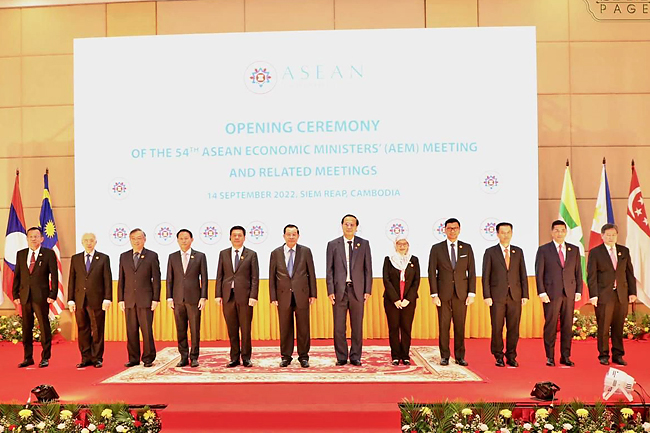Permanent Secretary (Economy, Trade and Industry) at the Ministry of Finance and Economy Dr Hajah May Fa’ezah binti Haji Ahmad Ariffin attended the 54th ASEAN Economic Ministers’ Meeting (54th AEM) and Related Meetings held from September 13 to 18 in Siem Reap, Cambodia.
The series of meetings, chaired by Cambodia’s Minister of Commerce Pan Sorasak included the AEM-36th ASEAN Free Trade Agreement (AFTA) Council Meeting; AEM-25th ASEAN Investment Area (AIA) Council Meeting; AEM-ASEAN Business Advisory Council (ASEAN-BAC) Consultation: the 54th AEM Meeting; AEM-Director General of World Intellectual Property Organization (WIPO) Interface Meeting; and the First Regional Comprehensive Economic Partnership (RCEP) Ministerial Meeting, and the various AEM Consultation with ASEAN’s Dialogue Partners, including Australia, Canada, China, European Union (EU), Hong Kong, China, India, Japan, Republic of Korea, New Zealand, Russia and the United States (US).
The AEM-36th AFTA Council Meeting discussed the importance of the ASEAN Trade in Goods Agreement (ATIGA) upgrade negotiations launched in March 2022 which aimed to foster intra-ASEAN trade and supply chain resilience.
During the AEM-25th AIA Council Meeting, the ASEAN Investment Report (AIR) 2022 was launched, which highlighted the latest developments in the investment environment in ASEAN such as the implementation of the ASEAN Investment Facilitation Framework (AIFF) adopted last year.
Under the theme of ‘ASEAN, ACT: Address Challenges Together’, the 54th AEM Meeting reaffirmed ASEAN’s commitment to regional economic integration. The ASEAN economic ministers expressed optimism that economic growth would continue in 2022 and 2023, with forecasts at five per cent and 5.2 per cent.
The ASEAN economic ministers also launched the ASEAN Framework Agreement on Competition (AFAC) negotiations, which aims to provide a fair and competitive business environment in ASEAN.

The ASEAN economic ministers also had a consultation with ASEAN-BAC. ASEAN-BAC representatives briefed on the progress of the implementation of their legacy projects which includes the ASEAN Digital Credentials Wallet, or AKREDI.
During the AEM-Dialogue Partner Consultation, the Economic Ministers from ASEAN and Dialogue Partner countries discussed the progress of ASEAN’s Free Trade Agreements (FTAs).
As ASEAN Country Coordinator under the ASEAN-Australia-New Zealand FTA (AANZFTA), Brunei Darussalam briefed the 26th AEM-CER Consultation on the progress of the implementation and upgrade negotiations of the agreement. Dr Hajah May Fa’ezah underscored the importance of concluding the negotiations.
The 28th AEM-METI Consultation recognised the progress of various initiatives and action plans carried out under the ASEAN-Japan Economic Cooperation in their almost 50 years of dialogue relations.
The meeting welcomed the proposal on Strengthening ASEAN-Japan Economic Relationship toward ASEAN-Japan 50th Anniversary in 2023. In this regard, the meeting also welcomed the work plan toward creating a “Future Design and Action Plan of an Innovative and Sustainable ASEAN-Japan Economic Partnership”.
At the AEM-USTR Consultation, the ministers endorsed the activities planned to be conducted under the 2022-2023 ASEAN-US Trade and Investment Framework Arrangement (TIFA) and Expanded Economic Engagement (E3) Work Plan.
The 18th AEM-EU Trade Commissioner Consultation endorsed the ASEAN-EU Trade and Investment Work Programme 2022-23.
The 25th AEM Plus Three Consultation endorsed the ASEAN Plus Three Economic Cooperation Work Programme (ECWP) 2023-24 and noted the implementation progress of the ECWP 2021-2022 while the 11th AEM-Russia Consultation welcomed the progress in the implementation of the ASEAN-Russia Trade and Investment Work Programme 2021-25 (the Work Programme).
The ministers also commended the Economic Research Institute for ASEAN and East Asia (ERIA) at the 10th EAS Economic Ministers Meeting, for its research support which contributes to strengthening regional economic integration, noting ERIA’s paper on East Asia Post Pandemic – An Integrative, Innovative, Inclusive, and Sustainable Region through Digitalisation.
The 6th AEM-Hong Kong, China Consultation witnessed the launch of the Business Guidebook to Increasing the Trade Competitiveness Using the AHKFTA which as a tool for micro, small, and medium-sized enterprises to reap the full benefits of the agreement.
The ministers also met with the various dialogue partners’ business councils including the Australia-ASEAN Chamber of Commerce (AustCham ASEAN), ASEAN-USTR Business Council, ASEAN-India Business Council, ASEAN-Korea Business Council, ASEAN-EU Business Council and ASEAN-METI Business Council.
The representatives briefed the meetings on the activities carried out by the business council and the recommendations made by the business community to enhance the business climate in the region.
The RCEP Ministers Meeting welcomed the entry into force of the Agreement on January 1, 2022 and looked forward to its ratification by all signatory states.


